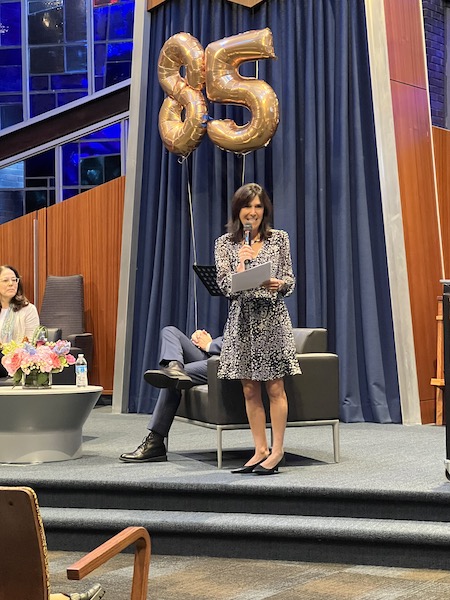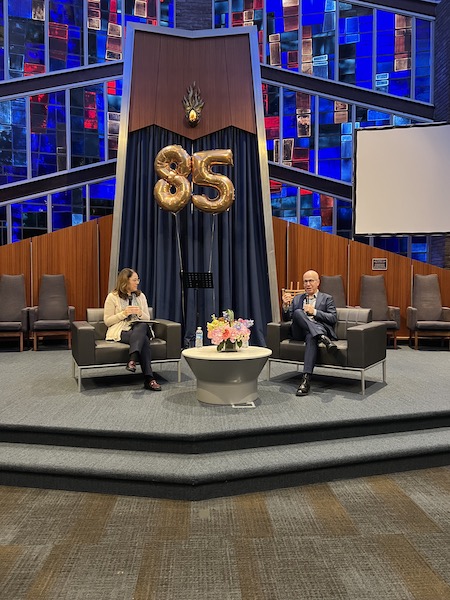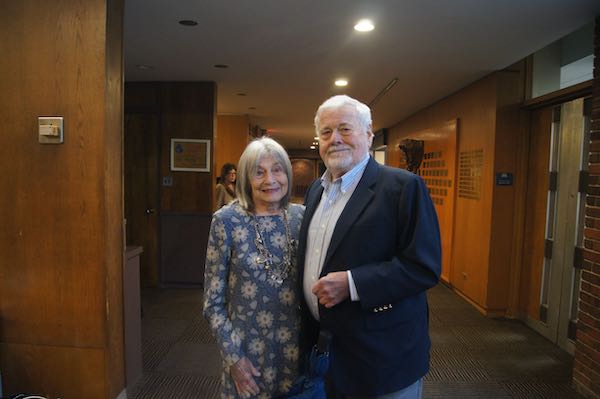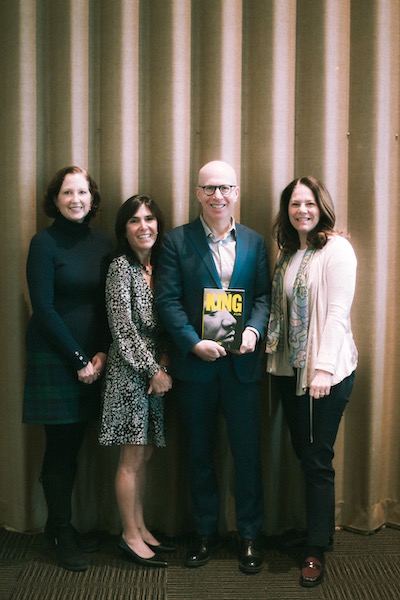A Treat for the Intellectually Curious at the SAS Afternoon of Learning
- Category: Schools
- Published: Wednesday, 06 December 2023 21:59
- Joanne Wallenstein
 Jill SerlingThough Scarsdale is primarily known for its public schools that educate students aged five to 18, the Village is home to another school without walls that does an exceptional job of offering education and enrichment to the adults in town.
Jill SerlingThough Scarsdale is primarily known for its public schools that educate students aged five to 18, the Village is home to another school without walls that does an exceptional job of offering education and enrichment to the adults in town.
On Sunday December 2, the Scarsdale Adult School commemorated its 85th birthday with an afternoon of programming at Temple Israel Center in New Rochelle that wowed the celebrants.
Introducing the day, Executive Director Jill Serling discussed the vitality of the school which has widely expanded its breadth and reach under her direction. She joked, “We’re 85 and still walking unassisted!”
She explained that until 2009 the school had only a fall and a spring semester, with primarily evening classes, but has now become a year-round endeavor with many offerings during the day. The program has extended beyond Scarsdale and classes take place all over Westchester and beyond with museum visits, tours of historic sites, gardens and neighborhood explorations.
And if that were not enough, in 2020, during the COVID crisis, the school began offering classes on ZOOM, which permitted students to study and explore online.
Along the way SAS has hosted classes taught by famous academics, writers and celebrities including Margaret Mead, Warren Buffet, Nicholas Kristof, Anna Quindlen and George Saunders.
The keynote presentation on Sunday was an interview with biographer Jonathan Eig who recently published a 669-page biography of Martin Luther King that has received much acclaim. He was interviewed by Lori Rotskoff who led him to share as much about himself as he did about the famed civil rights leader. Lori Rostkoff and Jonathan Eig
Lori Rostkoff and Jonathan Eig
Eig began his journalism career at the Journal News at the age of 16. As a shy kid he used his reporter’s notebook as a way to engage with others. He said, “Those little notebooks were a passport… my pass to get in anywhere. They gave me the power to walk into anybody’s room and ask for an interview. I am still doing the same job I did at 16.”
Eig has now written six biographies including the stories of Lou Gehrig and Muhammed Ali. He does exhaustive research on his subjects, searching for everything from “shoe size to cancelled checks to medical records.” King: A Life, took him six years to write.
He was inspired to write the book about King when he realized the last biography had been written 30 years ago and much had changed since then. He realized that there were still hundreds of people alive who knew King and set out to interview them all, targeting the oldest ones first.
Harry Belafonte was willing to talk. As famed biographer Robert Caro had advised him to do, Eig ”tried to get a feeling for what it was like to be in the room with King.” He asked Belafonte, “What did you do when you were bored?”
Eig was conscious of how he might appear to King’s family and friends. Eig explained, “As a white guy and a Jew, I approached this carefully. I asked for help from people in many different communities. No one objected to a white, Jewish guy writing the book. It helped that I asked for their help up front.”
Along the way, Eig found one of two copies of MLK’s father’s biography. No one knew it existed. It was quite a discovery.
Eig explained that King was born in 1929. He was not bruised by racism as all his ancestors, including his father, were preachers and he was surrounded by the church. A good student, he skipped grades and went to college at age 16.
King was launched into the national eye in September of 1955 when Rosa Parks was arrested for refusing to give up her seat on a bus to a white passenger. At the time, King was only 26 years old but was asked to speak the night of the bus incidents. He only had 20 minutes to prepare for the biggest speech of his life.
Eig continued to speak about the FBI targeting and following King, the March on Washington and his relationship with his wife Coretta Scott King. Eig explained, “King was a ladies’ man and had a blind spot when it came to women’s equality. According to Eig, King had many affairs, and King’s children may have refused to speak to Eig because they didn’t believe the stories of their father’s infidelity.
Discussing his own role, Eig said, “You have to try to look at the world through your subject’s eyes – but you know that you can’t know. It’s an exercise in failure. Your job is to be as accurate and honest as you can and admit what you don’t know. All I can do is to try to help you understand what he might have been going through.”
Following Eig’s interview, participants could attend one of three breakout sessions. We chose a look back at “American Protest Music in Literary and Cultural Contexts,” taught by Nicholas Birns.
Demonstrating an encyclopedic knowledge of his subject, Birns explained the historical roots of American folk music. He noted that in the 1800’s most political campaigns included a song that supporters sang to join in support.
Birns started with Woody Guthrie, nee Woodrow Wilson Guthrie who hailed from Oklahoma where is father was likely a member of the Klu Klux Klan. Guthrie’s songs mirrored the times. Pretty Boy Floyd romanticized the story of a bank robber. His song, I Ain’t Got No Home in this World emphasized feelings of alienation, joblessness, and poverty during the depression.
Woody Guthrie is best known for his song, This Land is Your Land, which the entire class sung together.
Birns went on to discuss Pete Seeger and his anti-war song, Where Have All the Flowers Gone, which asks a rhetorical question. The title encourages audience participation and has a role in answering the question posed in the song title.
Though Seeger came from comfortable roots, he had empathy for the common man and the down and out. The songs he sang with his group called The Weavers were sung in schools. Seeger’s We Shall Overcome, became the anthem to the Civil Rights movement. Birns also reviewed the role of Billie Holiday and her song Strange Fruit which told the story of the lynching of black men in the south.
Here are the powerful lyrics:
Southern trees bear strange fruit
Blood on the leaves and blood at the root
Black bodies swinging in the southern breeze
Strange fruit hanging from the poplar trees
Pastor scene of the gallant south
The bulging eyes and the twisted mouths
Scent of magnolias, sweet and fresh
Then the sudden smell of burning flesh
Here is a fruit for the crows to pluck
For the rain to gather, for the wind to suck
For the sun to rut, for the trees to drop
Here is a strange and bitter crop
Birns himself is a masterful storyteller and shared the back story of many songs that we know by heart but knew little of their origins. I’ll be watching for more of his classes at SAS.
I was sorry to miss Francis Morrone’s class on the New York art scene in the 1930’s, including Fernand Léger, George Grosz, Pavel Tchelitchew, Hans Hofmann, and Salvador Dalí, and American artists Reginald Marsh, Edward Hopper, Jackson Pollock, Stuart Davis.
The third breakout class was on transgender youth today. The session was a lively and well-informed dialogue led by Columbia Assistant Professor Tey Meadow, whose vast knowledge of the topic was matched by her empathy and openness. The listeners included the speaker’s parents, which made for some funny moments as they exchanged a few quips. Lots of great information for both topic experts and newbies in a relaxed and welcoming environment.
 Harriet Langsam Sobol and Alfred HuntThe afternoon was capped off with an inaugural SAS Hall of Fame ceremony, where Executive Director Jill Serling inducted two legendary teachers, Alfred Hunt and Harriet Langsam Sobol. Everyone raised a glass for a champagne toast to Alfred, who has taught a news class called Let's Talk Current Events to more than 90 students each week for a decade, and to Harriet, whose Book Talk class is an addiction for many--including one student who is temporarily living in France, but taking the course virtually this term despite the time difference!
Harriet Langsam Sobol and Alfred HuntThe afternoon was capped off with an inaugural SAS Hall of Fame ceremony, where Executive Director Jill Serling inducted two legendary teachers, Alfred Hunt and Harriet Langsam Sobol. Everyone raised a glass for a champagne toast to Alfred, who has taught a news class called Let's Talk Current Events to more than 90 students each week for a decade, and to Harriet, whose Book Talk class is an addiction for many--including one student who is temporarily living in France, but taking the course virtually this term despite the time difference!
Here's to 85 more years of learning at the Scarsdale Adult School.
 Deb Morel, Jill Serling, Jonathan Eig and Lori Rotskoff
Deb Morel, Jill Serling, Jonathan Eig and Lori Rotskoff







